Dear Brethren
The New Year has started off differently:
- Rain instead of the usual hot weather with clear blue skies
- Very busy with a 10 day safari to north Kenya, and teaching PTC students
- Many visitors to the services
Miathene
After preaching in our New Year’s Day service on Hebrew 13:8, I left with 2 of our young people for 10 days in north Kenya. Dominic has finished one year of the PTC. Jimmy is a fairly recent church member. We stopped for the night in Miathene (east of Mt. Kenya) with Paul Kianji, with whom I taught when I first came to Kenya in 1968! The church here has been in upheaval since one of the Pastors refused to accept his dismissal . We have been forced to go to court to seek to get him removed. The wheels of justice can go so slowly. I encouraged the other Pastors to re-gather the sheep and seek to meet in another place.
Rendille
(1) On 2nd. January we drove up to Korr, one of the main centres for Rendille people. I was a bit apprehensive because Patrick Ochieng’, the trained missionary leader, has had to go because of serious failures. But we found the 20 or so faithful members and the 3 evangelist-leaders together.
Joseph Ogom has just a few years’ education, so at least he is literate! Ruygon Nadesol and Godana Dabalen have no formal education. These are the ones leading the church. PRAY they may be faithful, especially in taking the gospel far and wide. Perhaps someone from outside can come to help them for a while until the Lord should be pleased to raise up more qualified leaders.
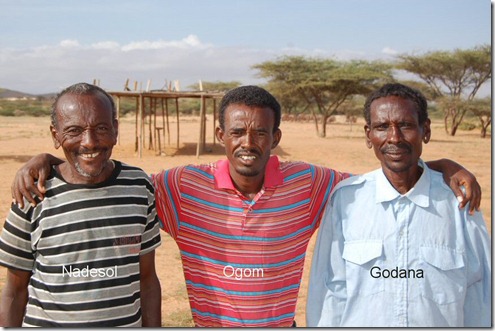
We were encouraged by the 40 or so adults and young people who gathered for worship on Sunday morning. The place of meeting we call ‘the shade’ is behind Nadesol and Ogom. Further back is the permanent stone building that has stalled because of the problems. We also made some visits outside the town to the goobs that surround. Farakoren is more than 20 kms. west and we went with a young man named Gabriel who has just completed his Secondary Schooling. He is from a Catholic background but professes to be saved. He was in our High School Camp in Nairobi in December. We were able to preach the gospel to around 25 adults under a tree outside the goob. Afterwards as we drank delicious tea in Gabriel’s sister’s hut I asked her what she had learned from the preaching. It was encouraging to hear her say, ‘Everyone has sin and must change’. It was my opportunity to press on her that only the Lord can bring about that change. Before leaving some leaders requested that we bring a church so that there is regular preaching, and that we help them in supporting the Early Childhood Development (ECD) teacher.
This is the Nahgaan goob (village). We are standing outside the hut of Ali Leeba (2nd. left). He professes to be a Christian but hardly ever comes to worship as he stays with his animals in the ‘foor’ = a temporary settlement as they move about looking for pasture for the animals.
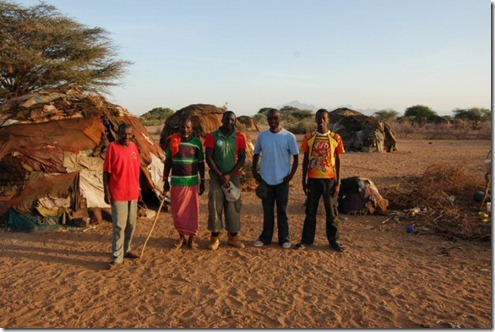
Timo Galgatho (1st. left) is inside her hut. She is a widow, baptized upon profession of faith in Christ. Widows do not remarry so can face hardships with children to care for. We asked her about the dried branches at the entrance to the hut which say she has participated in the ‘sooriyo’ tradition. She says she does not participate but the wazee (men leaders) force her. We have suggested that such believers come to the town at such times to be with other Christians.
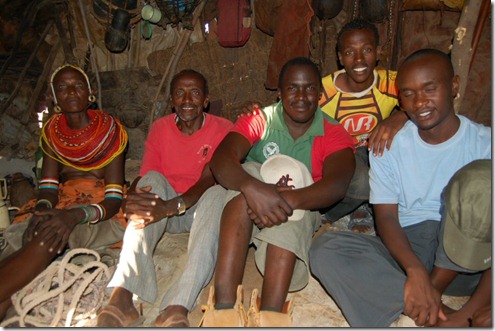
(2) On 7th. January we drove the 30 kms. south to the Lekuchula goob at the foot of Mt. Bayo. Again I was not sure what I would find as there had been rumours that another church had sought to take over our Primary School. This proved to be quite unfounded as we met with Mario and the 2 faithful ladies here – Ntiito and Nduruba. They told us they meet for worship on Sunday with up to 20 present. One of the things we have to seek to do soon is to help both Ogom and Mario with simple materials to help them in their preaching.
At the Lekuchula goob multitudes of animals – camels, cows, goats and sheep – leave early morning. We go under the tree outside the goob to have our devotions together.
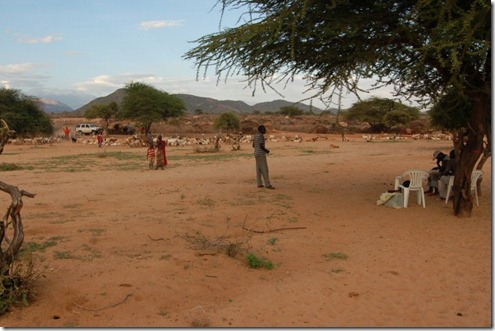
Dominic & Jimmy are with a ‘moran’ (young unmarried men who look after the animals). He slaughtered a goat for us to eat.
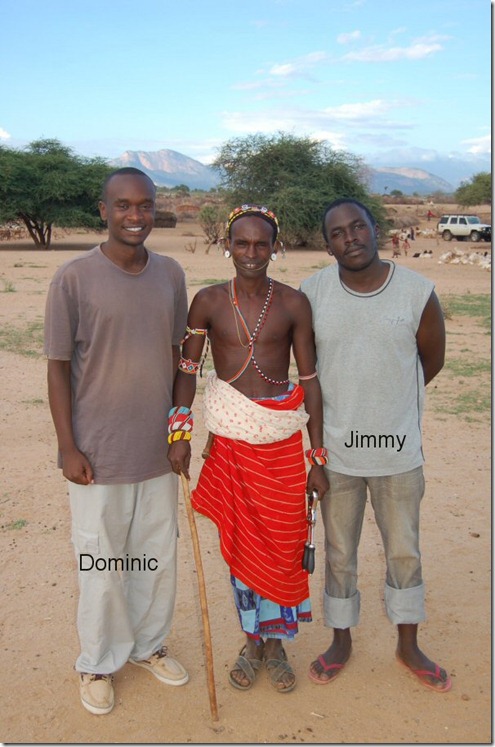
(3) On 8th. January we drove another 25 kms. south-east across the now dry Malgis River. Raphael Bulkash is labouring to plant a church among the 4 goobs of Ndikir. We were pleasantly surprised that the Government has built one classroom here as the beginning of a Primary School, has sent a Headteacher, and has listed Trinity Baptist Church as the sponsor! Spiritually Raphael is finding it hard with no positive spiritual response. However, we were so encouraged when we visited more interior Losidan where we also sponsor a Primary School. The village leader is an illiterate man called Lepakio. When we arrived he went from hut to hut waking people up to come and hear the preaching, and even stopped men from playing their favourite board game. On arrival we received the sad news that a lady had died a few days before after giving birth. She was a third wife and it was her first child. This was the occasion to talk about death. Why do we die? How does Jesus Christ save us from death? We also had to pay attention to a boy who had fallen into a fire and had a severely burned back. As we later drank tea with Lepakio I remarked that it is hard for him to follow the message of the gospel for it is a straight and narrow way and demands leaving the old life. His reply was gripping. ‘Did you not see how I sought to bring everyone to hear the Word? That is how much I desire it for myself! I wish I am like Nadesol, although illiterate like me, yet able to tell others the word of God.’ We pray that the Gospel is beginning to take root in a place where there is total spiritual darkness.
2013
Please pray for wisdom and strength, and especially for the Lord to use the following ministries in the first few months of 2013, in addition to the normal weekly ministries.
- Pastoral Training Course (PTC) in January & March.
- Resumption of Meaty Forum, 2nd. Friday of each month.
- AGM, 9th. February.
- Reformed Baptist Association of Kenya (RBAK) meetings 15-18th. February here in Nairobi.
- Ministry in Pokot North at the end of February.
- General elections on March 4th. that we earnestly pray will end peacefully, not like 5 years ago.
- 35th. Anniversary of beginning of Trinity Baptist Church, Nairobi, 15-17th. March, with Pastor Geoffrey Thomas as our guest.
- Reformation Conference in west Kenya (Mumias) 10-14th. April at which hundreds are expected to attend!
We thank God for your continued fellowship, support and prayers.
In Christ’s service,
Keith & Priscilla Underhill








